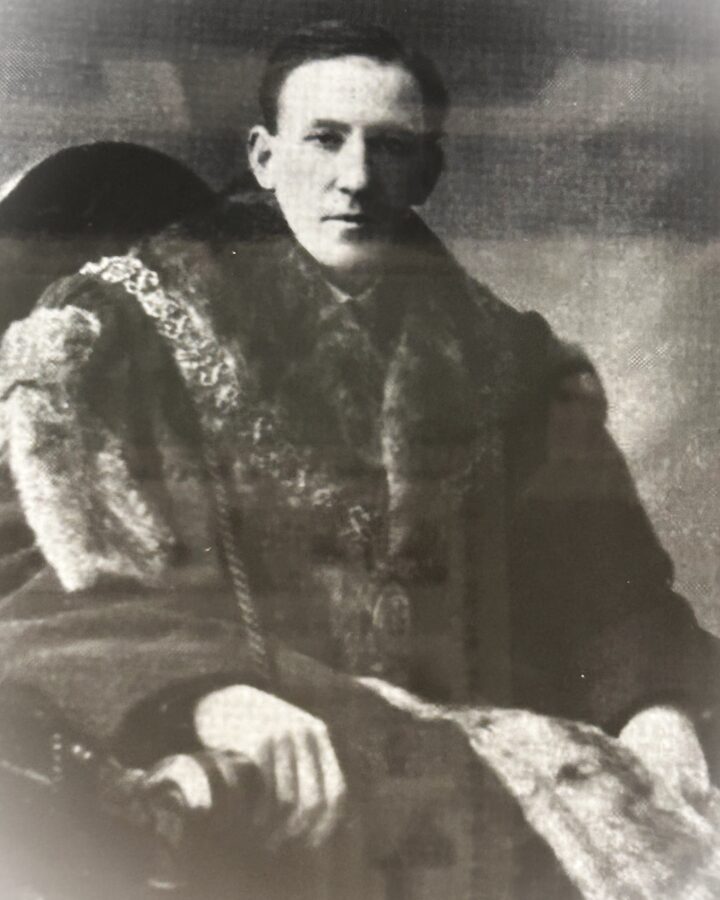
Kieran’s Our City, Our Town Article,
Cork Independent, 25 April 2024
Making an Irish Free State City – The Lord Mayor is Interviewed
On 21 August 1924 in the Council Chamber of the Cork Corporation, Mr Nicholas O’Dwyer, Chief Engineering Inspector Local Government Department, opened a sworn inquiry into the performance of the duties of Cork Corporation.
On 28 August, the Lord Mayor, Councillor Seán French was examined. The Cork Examiner describes that he took umbrage against the line of general questioning given by the inquiry to that date, much of which he deemed outside of the scope of the inquiry itself. He deemed that the witnesses, who had given their evidence and made complaints about the workings of the Corporation, had been asked rather pointed questions by the inquiry.
The Lord Mayor continued to say on behalf of his colleagues and himself that they desired to have published as broadly as possible the evidence. If there was the slightest question against the honour of those members of the Corporation, individually or collectively, he wished for the inquiry to produce that evidence.
The Lord Mayor wished to draw attention to a proposal he made in public after his election as Lord Mayor. At a meeting of the Cork Catholic Young Men’s Society, he suggested that a serious attempt should be made to educate the citizens in local civics and to instil into them an interest in local bodies. That to his mind this was the greatest drawback in public administration not only in Cork, but all over Ireland; “The citizens not alone in Cork, but throughout the country in general, did not give sufficient attention to civic affairs, and if they did so he was sure that their services would lead towards one way and that was towards better administration if that were possible”.
The Lord Mayor continued to note that in 1920 a Departmental Committee within Cork Corporation was elected under Lord Mayor Tomás MacCurtain to go into the question of the work in each department with the view of “effecting economies”. Lord Mayor MacCurtain had but three months in office before death. The committee continued during the short lifetime of Terence MacSwiney.
Lord Mayor French added that in late 1920 it was only under circumstances of great difficulty that the members of the Corporation were able to approach the Municipal Buildings or City Hall. He describes that the premises were continually raided by British forces and documents were taken, and every department of the Corporation was generally upset; “There was also a considerable risk to individual members of the Corporation in their giving of their full time to the work of that body…Lord Mayor McCurtain was murdered in March, during the period in which the Corporation should strike its half-year’s rates. They would admit that that period would seriously affect quick administration, but it altogether delayed the adoption of the estimates for fully a month or two months. Unfortunately, during the next period that they were to strike their rates, a similar thing or circumstances occurred”.
The Lord Mayor also outlined that in December 1920 when the City Hall was burned with all its documents, the Corporation was completely paralysed and every department in it.
In July 1921, at the re-election of his predecessor in office in the courthouse, Donal Óg O’Callaghan, the building was surrounded by military and police. On that occasion, fourteen members of the Corporation were arrested and interned; He noted; “They were useful members out of a total body of fifty-six members, and deducting them with the members who could not come and a few others who had something else to do, a position of great embarrassment was presented”. The Lord Mayor described that the position was so bad that it was with difficulty a quorum of three could be obtained for meetings of some of the Committees; “Within a month or two we became definitely aware that the Councillors who had been arrested would not be released and that meant the electing of other members in their places, and then time had to be devoted to the education of new members in their duties”.
As regards the question of rates, the Lord Mayor noted they were “honesty set” for the benefit of the city; “The work of the Corporation was in defence of the people who contributed the bulk of the rates – it was pure democratic control – and if they were honest to these people, who would return them again, they could not turn around and say to the people of Cork that they wero deliberately dishonest in condoning dishonesty”. The rates income, he contended, were showing a downward income tendency, and in this conundrum, he pointed out the difficulties, which confronted the Corporation with regard to income and service provision itself.
The Lord Mayor alluded to statements that it had been suggested that the high rates were responsible for the non-building of premised and houses in Cork. The Lord Mayor implored upon the inquiry to walk through the city centre and see that many buildings despite getting compensation had not begun work; “If the inspector had walked along St Patrick’s Street since he came to Cork he would find that during the three years that had passed since the premises in that area had been destroyed, very little progress had been made in the rebuilding of those premises”.
Alluding to the condition of the streets, the Lord Mayor held that they compared favourably, with those of any city in Ireland; “The Corporation would block-pave every lane and alley in Cork if they could. The men in that particular department were doing eachof them a mile and a half of street per man, and I hold that that was too much for any man”.
To be continued…
Caption:
1250a. Portrait of Lord Mayor of Cork Cllr Seán French, 1924 (picture: Cork City Council).